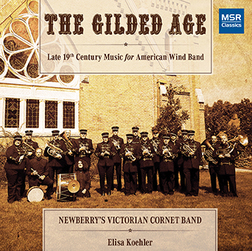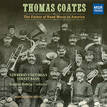|
|
NEWBERRY'S VICTORIAN CORNET BAND
Also Available
THE GILDED AGE
Late 19th Century Music for American Wind Band
Edward Beyer, Ernesto Cavallini, Thomas Coates, August Damm, Patrick Sarsfield Gilmore, Allesandro Liberati, Jean Marie Missud, Ciro Pinsuti, George Schleiffarth, John Philip Sousa, Giuseppe Verdi, émile Waldteufel
NEWBERRY'S VICTORIAN CORNET BANDDominic Giardino B-flat, clarinet
Christine Erlander Beard, piccolo
Don Johnson III B-flat, cornet
ELISA KOEHLER, conductor
Period Instruments
[ MS1726]
$14.95
LISTEN
REVIEWS
"Apart from the intelligent and coherent program, the ensemble playing under Elisa Koehler’s baton makes this disc a fine addition to the relatively small number of recordings of this repertoire. The interpretations are both learned and musical, full of tasteful refinement... It is easy to overblow these small-bore instruments and to devolve into garish and unholy sounds. Fortunately, the band members keep a tight leash on their horses, and the playing is sophisticated and refined... The sound is focused and clean, and the intonation is surprisingly good considering the limitations of the historic—not reproduction—instruments... For anyone interested in the history of band music, this is one not to miss."
Maiello, Fanfare [November/December 2021]
"My favorite selections are the tasteful and nuanced readings of Sousa’s `Semper Fidelis’ and Ciro Pinsuti’s lovely serenade on `Good Night Beloved’... Dominic Giardino, playing a clarinet made somewhere around
the 1870s, is the fine soloist in Cavallini’s `La Sonnambula’ Fantasia. Christine Erlander Beard shows excellent technical skills on her ca-1900 piccolo in August Damm’s `Through the Air’. Allesandro Liberati’s fantasia on `Battle Cry of Freedom’ is given an impressive reading by Don Johnson III, playing an 1882 “echo-bell” cornet. A very enjoyable album."
Kilpatrick, American Record Guide [September/October 2021]
"Played on period instruments, these bold and lyrical performances of mostly forgotten repertoire convey the old-time pleasure of experiencing a concert at the town bandstand on a summer night... Throughout, Koehler leads the ensemble in sturdy accompaniments. Strong in all sections, the Newberry musicians blend their parts for a robust sonority while navigating the unique styles of every piece with sensitivity."
Aaron Keebaugh, Early Music America [October 2021]
"...a fascinating group of pieces: completely unfamiliar to me apart from Sousa’s Semper Fidelis and some Verdi things... the level of playing is superb, much better, one presumes, than what we would usually have heard back then. I must single out the soloists, each of them quite spectacular: Dominic Giardino, clarinet, with a Fantasia on La Sonnambula; Don Johnson III, cornet, on a set of variations on The Battle Cry of Freedom; and Christine Erlander Beard, piccolo, on Through the Air. These may be the high points, as they surely would have been back then; but the CD really has no low points. It’s a thoughtful and entertaining program, with equally thoughtful and entertaining program notes by Michael O’Connor. I think we are ready for this music now."
Kenneth Kreitner, U-Memphis, Historic Brass Jorunal [Sep 2021]
"A walk down memory lane? Maybe, but for many a ravishing introduction to the beauties of a forgotten, yet highly significant age.... [ * * * * * ] [The Newberry Victorian Cornet Band] are in effect a 'period instrument' group that seeks to present music as it was heard then, in all the various formats and presentations one might have heard in a concert in the park. The stylistic talent of these folks is superb; intonation spot on, great technique, and a real feeling—and dare I say devotion—to this music and its importance. The nostalgic element is unavoidable, but when you relax and just listen to the music as music, you quickly find yourself enjoying it for its own sake. This is refreshing, buoyant, and a perfect antidote for the considerable angst of our present day. The sound is natural and perfectly balanced, showing these outstanding musicians to full advantage. Enthusiastically recommended!
Steven Ritter, Audiophile Audition [August 2021]
"Even when the pieces are trifles, as many are, they are very pleasant to hear, and the entire disc is played exceptionally stylishly and with all the enthusiasm that the music deserves – which is quite a lot. The period instruments fit the music ideally, and the CD as a whole is a most-welcome time capsule giving entry to an earlier, perhaps more-optimistic, perhaps more-naïve America in which musical entertainment – before there were recordings, before there was radio – was largely the province of bands that, at their best, were as skilled as Newberry’s Victorian Cornet Band."
Mark J. Estren, InfoDad [June 2021]
"The band’s overall performance is quite enjoyable and in this case, invigorating and uplifting, whether you may be a fan of band music or not, as it is with all fine music played passionately."
Joel C. Thompson, Cherry Grove Music Review [May 2021]
PROGRAM NOTES
The term “ Gilded Age” (c. 1870-1890) conjures up images of American opulence and dynamism. It was also a period of great social and financial inequality and conflicting ideas about the role and reach of capitalism. Newly developed industries attracted thousands upon thousands of individuals and families from the uncertain life of farm work to the factories of the major cities, their numbers increased by immigrants escaping crushing poverty and political chaos in parts of Europe. A small number of businessmen became magnificently rich, but little of that saw its way to the workers. As a counter to this, the people’s representatives passed laws to curb some of these excesses, helping to pave the way for the Progressive Era that followed.
The years 1870–1890 saw innovations that made Americans’ lives somewhat easier. Gas lighting, indoor plumbing, railroads, and mass production of goods and materials created a booming economy. At the same time, mass immigration spurred nativist reactions, workers felt compelled to band into labor unions, and the drive to settle the Great Plains and the West resulted in further loss of territory and dignity for the indigenous peoples living there. This period of American history also saw a flowering of the arts in the United States. While this included the budding of a uniquely American artistic voice, German immigrants continued to dominate American music both in the concert hall and in the domestic parlor. For native musicians, however, popular music now benefitted from the development of an ecosystem of publishers, music stores and instrument makers, providing an outlet for a distinctively American musical landscape. For many Americans, the latest popular songs were brought to them by wind bands.
Following the American Civil War (1861–65), thousands of well-practiced, former military bandsmen formed or joined bands in their hometowns. Bands were considered essential organizations for any respectable Victorian-era town or city, and many locales had a number of ensembles. The popular town bands were augmented by visiting professional ensembles and bands associated with local fire stations, police precincts, mines and factories.
The explosion in band membership benefitted from the development of factory-produced instruments in Austria and France, along with their American import partners such as Lyon and Healy, Bruno and Son, Wurlitzer, Jenkins, and J. W. Pepper. In addition to instruments, American publishers began supplying inexpensive wind-band arrangements of popular songs, ethnic medleys, dances, marches, and more ambitious transcriptions of orchestral and operatic music in large number. This was truly the beginning of the Golden Age of band music in America.
Newberry’s Victorian Cornet Band dedicates this recording to Don Johnson, Jr., who passed away suddenly in 2016. He was a dear friend of the band and father to our cornet soloist, Don Johnson III. Don was a wonderful cornetist and an avid collector of J. W. Pepper brass instruments. He had a great passion for the trumpet and historical performance and established and led his own ensembles, including the Marine Band that appears in the Spielberg film Lincoln. He was a true and respected friend to all in the historic brass community, so it is especially gratifying to have his son play Liberati’s The Battle Cry of Freedom, a Civil-War-themed cornet solo published by J.W. Pepper on an 1882, Distin-made, J.W. Pepper echo-bell B-flat cornet from his father’s collection on this recording.
NEWBERRY’S VICTORIAN CORNET BAND was founded in 2002 by Michael O’Connor to explore the largely forgotten repertoire of wind band music composed between the end of the Civil War and the advent of the Sousa Band in 1892. This was a formative era for the instrumentation and the music of the American wind band, and the music played by these bands was one of the primary entertainment options available to most Americans. The Newberry Band plays only music published during this time on instruments from the era with original period mouthpieces.
Elisa Koehler is a noted performer, conductor, academic administrator and author of books on trumpet pedagogy and history. She has been the conductor and “leader” of Newberry’s Victorian Cornet Band since 2006. Holding trumpet performance and conducting degrees from the Peabody Conservatory and the University of Tennessee, Dr. Koehler currently serves as Chair of the Music Department at Winthrop University (South Carolina), where she conducts the Winthrop Symphony Orchestra. Over her varied professional trumpet career, she has performed with the Baltimore Chamber Orchestra, the Dayton Philharmonic Orchestra, the Knoxville Symphony Orchestra, the Lyric Brass Quintet, and as the solo trumpeter of Baltimore’s Bach Concert Series. As a period-instrument performer, she has recorded and performed with The Bach Sinfonia, the Handel Choir of Baltimore, the Washington Cornett and Sackbutt Ensemble, and Newberry’s Victorian Cornet Band. A noted writer on historic brass, Dr. Koehler is the author of Fanfares and Finesse: A Performer’s Guide to Trumpet History and Literature (Indiana University Press), A Dictionary for the Modern Trumpet Player (Rowman & Littlefield), numerous articles, and performing editions of the Haydn and Hummel trumpet concertos published by Carl Fischer Music. and serves as Secretary of the International Trumpet Guild.
Recorded 31 July-2 August 2018 at North Albany Studios, Menands, New York. A Candlewood Digital high resolution Natural Presence™ recording: Produced, edited and mastered by Richard Price. Engineered by Wayne Hileman and
Richard Price. PROGRAM
Patrick Sarsfield Gilmore
Salute to New York March
Edward Beyer
Yankee Tickle Medley
Ernesto Cavallini
Fantasia “La Sonnambula”
Giuseppe Verdi
Overture. Nabucodonosor
Jean Marie Missud
“Mañana” Chilean Dance
George Schleiffarth
Jolly Bears (Polka Humoristic)
August Damm
Through the Air
John Philip Sousa
Semper Fidelis
Ciro Pinsuti
Serenade “Good Night Beloved”
Allesandro Liberati
The Battle Cry of Freedom
Thomas Coates
“I Am Up” Quickstep
Émile Waldteufel
L’Estudiantina Waltz
Giuseppe Verdi
Terzetto and Finale from Attila
MSR Classics
THOMAS COATES
The Father of Band Music in America
NEWBERRY'S …
[MS1556]
|


